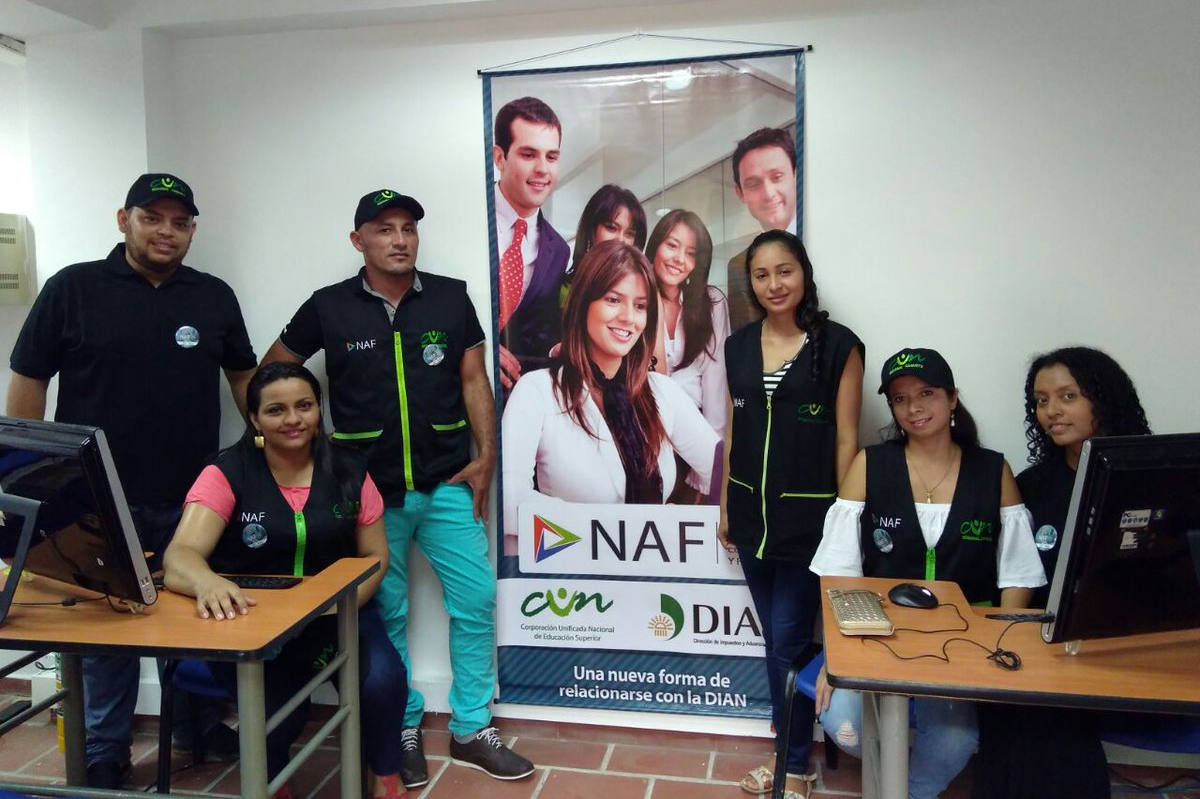-
05 April 2018
Category : Opinion
Taxation, the state and the public in the labyrinth of the post-conflict (III)
In the last stage of the journey with EUROsociAL+, we head to San Vicente del Caguán to attend the inauguration of the NAF
 NAF in the San Vicente del Caguán citizens' group home
NAF in the San Vicente del Caguán citizens' group homeThe municipality of San Vicente del Caguán has been particularly affected by armed conflict. Its inhabitants are trying to free themselves from the stigma of living in a ‘land of guerrillas’. The town was at the heart of the El Caguán demilitarised zone—–where the army would not enter–—during the Andrés Pastrana administration, something which allowed FARC to consolidate is influence in the region.
We are now heading there to inaugurate an NAF. The three-hour journey from Florencia passes through idyllic landscapes peppered with military roadblocks. Stories of armed conflict are inevitable: “presidential candidate Ingrid Betancourt was kidnapped making this same journey, three days after Pastrana broke off contacts with the FARC”, “the parliamentarian Diego Turbay was killed here a few minutes before arriving at the town of Puerto Rico”.
A car crosses our path, a strange manoeuvre which puts us on our guard. The suspicious vehicle has changed lanes to access a farm. False alarm. These are new times, but past fears have not abated. There are still FARC splinter groups who have not abandoned their weapons.
Taxes for development
The NAF is located in a citizen coexistence centre which offers services to vulnerable people: a family commissioner, police inspection, coordinating council meetings, a victim assistance unit, and so on. The mayor of San Vicente del Caguán, who opposes the peace agreements, is currently in Europe to see the lessons learnt in Northern Ireland first-hand. A total of 53% of the population of Caquetá voted against the agreement, so reconciliation has a long and difficult road ahead.
We are met by Cecilia Collazos, the acting mayor and social development secretary. In her view, tax fraud is mainly due to a culture of avoiding paying taxes: “rather than difficulties understanding the tax system, what there is here is a culture of non-payment and hiding real income in order to avoid taxes. The peace agreements have brought some changes, but there is still extortion, there are still splinter guerilla groups in the area. Real peace is achieved through projects, investment and employment”.
For Cristián, who studies accounting, the NAFs are very useful for his future career: “the accounting component focuses mainly on taxation, and the NAFs give us the chance to offer guidance to people with low incomes and so they can then be competitive in a market like San Vicente del Caguán, where there are a lot of businesses and lots of accountants are needed”. For Cristián, it’s obvious that development and taxation go hand in hand: “if we want social investment, we need to contribute by paying taxes. It will be difficult and we will encounter a lot of opposition at the start, but we will gradually provide a good service for the well-being of communities”.
The creation of the NAF is met with satisfaction from the business sector in San Vicente. This is the message we get from César Augusto España, coordinator of the Business Services Centre at the Chamber of Commerce of Caquetá: “We are three hours from Florence, where the DIAN (Colombian National Taxes and Customs Directorate) has its offices, and the NAF will expedite the process of fiscal formalisation in all municipalities”. España argues that “there is resistance to paying taxes due to limited access to public services and the scarce presence of the State. A full 98 per cent of companies in Caquetá are micro-enterprises and tax revenues are low, but the peace agreements are starting to stimulate the economy: in 2017, these companies grew by 34%”.
Light at the end of the tunnel
Despite the many obstacles, Hernando Vásquez, District Director for the DIAN, is optimistic about the new state of affairs: “I have been to almost 80 per cent of municipalities and I have encountered more receptivity. The public are asking us to assist and guide them in voluntarily meeting their tax obligations”.
Long-lasting peace and economic development are what the inhabitants of Caquetá most long for. A fertile, hospitable land with enormous potential for rural tourism and agricultural development, with a real desire to show that its fate is not sealed and that things can be different. It is now up to them to take the necessary steps to regain security and social cohesion.
It is also up to the institutions, who must forge a new relationship between the State and citizens based on reciprocity, a process in which civic-tax education will be enormously useful as a communication channel between the two.
Citizens and institutions both know that if they wait for the other side to do something, the vicious cycle of ‘not paying taxes-scarce public services-mistrust of the State’ could go on forever. To find a way out of the labyrinth of the post-conflict, it is necessary to move forward decisively with our sights set on a better future.
Borja Díaz Rivillas, Senior Expert in Democratic Governance for the EUROsociAL+ Programme
Read the first two parts:
Taxation, the state and the public in the labyrinth of the post-conflict (I)
Taxation, the state and the public in the labyrinth of the post-conflict (II)
The views and opinions expressed in this blog are the sole responsibility of the person who write them.






